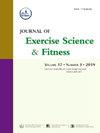Impact of aerobic exercise on immune components across healthy and diseased populations: A systematic review and meta-analysis of randomized controlled trials
IF 2.4
2区 医学
Q2 SPORT SCIENCES
引用次数: 0
Abstract
Background
Aerobic exercise may improve immune component quantities in healthy and diseased populations, but its effects across different health conditions and immune systems remain unclear. This review examined its impact on immune components in both populations.
Methods
A search in June 2025 across four databases included randomized controlled studies on aerobic exercise's effects on immune components in adults. Data (M ± SD) were extracted and converted to standardized mean difference (SMD) using random-effect meta-analysis.
Results
Seventeen studies (502 participants) were included. The meta-analysis results showed long-term aerobic exercise increased T-cell counts in diseased individuals (p < 0.05) but not in healthy ones (p > 0.05). It significantly reduced IgA levels in healthy participants compared to non-exercising controls (p < 0.05), potentially counteracting natural temporal increases observed in sedentary populations, without affecting IgG, IgM, leukocytes, neutrophils, or monocytes in either group (p > 0.05). Single-pass exercise did not alter leukocytes, lymphocytes, CD3+, or NK cells in healthy participants (p > 0.05).
Conclusions
Long-term aerobic exercise primarily affects adaptive immune components, benefiting individuals with unstable immune conditions. Single-pass exercise has no effect on healthy populations, making long-term interventions more suitable for improving adaptive immunity in unstable immune states.
Systematic review registration
www.crd.york.ac.uk/PROSPERO/, identifier: CRD42024546696.
有氧运动对健康和患病人群免疫成分的影响:随机对照试验的系统回顾和荟萃分析
有氧运动可以提高健康和患病人群的免疫成分数量,但其对不同健康状况和免疫系统的影响尚不清楚。本综述研究了其对两种人群免疫成分的影响。方法于2025年6月在四个数据库中检索了有氧运动对成人免疫成分影响的随机对照研究。提取数据(M±SD),采用随机效应meta分析转换为标准化平均差(SMD)。结果纳入17项研究(502名受试者)。荟萃分析结果显示,长期有氧运动增加了患病个体的t细胞计数(p < 0.05),而没有增加健康个体的t细胞计数(p < 0.05)。与不运动的对照组相比,它显著降低了健康参与者的IgA水平(p < 0.05),潜在地抵消了久坐人群中观察到的自然时间增加,而不影响两组的IgG、IgM、白细胞、中性粒细胞或单核细胞(p < 0.05)。单次运动没有改变健康参与者的白细胞、淋巴细胞、CD3+或NK细胞(p > 0.05)。结论长期有氧运动主要影响适应性免疫成分,有利于免疫状态不稳定的个体。单次运动对健康人群没有影响,使得长期干预更适合于在不稳定的免疫状态下提高适应性免疫。系统综述注册www.crd.york.ac.uk/PROSPERO/,标识符:CRD42024546696。
本文章由计算机程序翻译,如有差异,请以英文原文为准。
求助全文
约1分钟内获得全文
求助全文
来源期刊
CiteScore
5.10
自引率
3.60%
发文量
54
审稿时长
31 days
期刊介绍:
The Journal of Exercise Science and Fitness is the official peer-reviewed journal of The Society of Chinese Scholars on Exercise Physiology and Fitness (SCSEPF), the Physical Fitness Association of Hong Kong, China (HKPFA), and the Hong Kong Association of Sports Medicine and Sports Science (HKASMSS). It is published twice a year, in June and December, by Elsevier.
The Journal accepts original investigations, comprehensive reviews, case studies and short communications on current topics in exercise science, physical fitness and physical education.

 求助内容:
求助内容: 应助结果提醒方式:
应助结果提醒方式:


